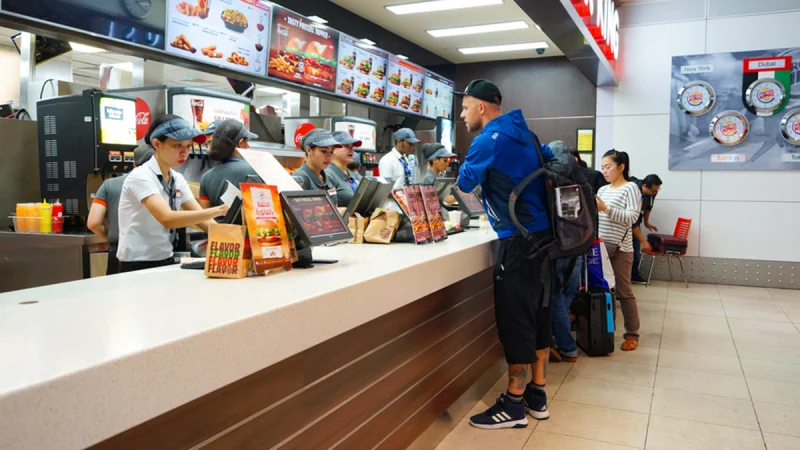In the fast-paced world of quick-service restaurants, fast food customer service plays a pivotal role in shaping customer satisfaction and loyalty. With convenience and speed being the cornerstones of the fast food industry, providing excellent service is not just a bonus—it’s a necessity.
This article explores the importance of customer service in the fast food industry, common challenges, and actionable strategies to enhance the customer experience. Whether you’re a restaurant manager, employee, or customer, understanding the value of exceptional service can transform the dining experience for everyone involved.
Why Is Fast Food Customer Service Important?
Customer service in fast food isn’t just about taking orders; it’s about creating a positive and efficient experience for every guest. Here’s why it matters:
Customer Retention
A positive interaction can turn first-time diners into loyal customers.
Competitive Advantage
In an industry where similar menus abound, great service can set a restaurant apart from competitors.
Brand Reputation
Word-of-mouth and online reviews heavily influence a restaurant’s reputation, and exceptional customer service often earns high praise.
Increased Revenue
Satisfied customers are more likely to return, recommend the restaurant, and even spend more during their visits.
Key Elements of Exceptional Fast Food Customer Service
Speed and Efficiency
Fast food lives up to its name when orders are prepared and delivered promptly. Delays can frustrate customers and harm the dining experience.
Accuracy
Getting the order right the first time is crucial. Mistakes not only inconvenience the customer but also increase operational costs for the restaurant.
Hospitality and Friendliness
A smile, polite language, and a willingness to help can turn a simple meal into a memorable experience.
Cleanliness
A clean and well-maintained dining area, kitchen, and restroom create a welcoming environment for customers.
Problem Resolution
Handling complaints effectively can turn a dissatisfied customer into a loyal one. Prompt and empathetic solutions show that the restaurant values its patrons.
Common Challenges in Fast Food Customer Service
High Customer Turnover
The fast-paced nature of the industry can make it difficult to deliver personalized service.
Staffing Issues
Employee burnout, high turnover rates, and understaffed shifts can negatively impact service quality.
Order Volume Peaks
During lunch and dinner rushes, maintaining speed and accuracy can be challenging.
Customer Expectations
Modern customers expect more than just fast food; they want quality, customization, and convenience.
Language and Communication Barriers
Miscommunication between staff and customers can lead to mistakes and dissatisfaction.
Strategies to Improve Fast Food Customer Service
Invest in Staff Training
Equip employees with the skills to handle customer interactions effectively:
- Teach proper communication techniques.
- Train for multitasking during peak hours.
- Focus on problem-solving skills.
Leverage Technology
Digital tools can streamline operations and improve the customer experience:
- Use self-service kiosks to reduce wait times.
- Implement mobile apps for online orders and payments.
- Utilize POS systems that ensure order accuracy.
Create a Positive Work Environment
Happy employees are more likely to provide excellent service:
- Offer competitive wages and benefits.
- Recognize and reward staff for exceptional performance.
- Foster teamwork and open communication.
Focus on Customer Feedback
Actively seek and address feedback to identify areas for improvement:
- Use online surveys or in-app reviews.
- Monitor social media for customer opinions.
- Implement changes based on recurring complaints or suggestions.
Enhance the Drive-Thru Experience
Drive-thru services are critical for fast food businesses. Improve efficiency by:
- Using dual-lane drive-thrus to handle more customers.
- Training employees to take accurate orders quickly.
- Ensuring clear and audible communication at order kiosks.
The Role of Technology in Fast Food Customer Service
Mobile Ordering and Payments
Apps like McDonald’s and Chick-fil-A’s mobile platforms allow customers to order ahead, customize meals, and pay digitally.
Self-Service Kiosks
These reduce wait times and empower customers to place accurate orders at their convenience.
AI-Driven Analytics
Data analytics can track customer preferences, enabling restaurants to personalize promotions and improve service efficiency.
Examples of Exceptional Fast Food Customer Service
Chick-fil-A
Known for its polite and friendly staff, Chick-fil-A prioritizes customer satisfaction by ensuring consistent service quality.
In-N-Out Burger
This chain excels in order accuracy and cleanliness, creating a loyal customer base that appreciates attention to detail.
Starbucks
While not traditional fast food, Starbucks focuses on personalized service by remembering customer names and preferences.
Benefits of Great Customer Service for Fast Food Restaurants
- Higher Customer Loyalty: Regular customers generate consistent revenue.
- Positive Online Reviews: Great service attracts more patrons through social proof.
- Operational Efficiency: Well-trained staff handle orders faster and with fewer errors.
- Employee Satisfaction: A customer-focused culture motivates employees to perform better.
Conclusion
Customer service is the backbone of the fast food industry, ensuring that customers enjoy more than just a quick meal. By prioritizing speed, accuracy, and hospitality, fast food chains can build lasting relationships with their patrons and stand out in a competitive market.
With the right strategies, training, and technology, any fast food restaurant can deliver a memorable dining experience that keeps customers coming back for more. Whether you’re an operator or a customer, understanding the value of fast food customer service is essential to appreciating the industry’s impact on our daily lives.
FAQs
1. What is the role of customer service in fast food?
Customer service ensures a seamless dining experience by focusing on speed, accuracy, and hospitality. It’s essential for customer retention and brand reputation.
2. How can fast food chains improve service quality?
Invest in staff training, use technology like self-service kiosks, and actively address customer feedback to improve service quality.
3. What is the most common complaint about fast food service?
Common complaints include slow service, incorrect orders, and unfriendly staff interactions.
4. Why is customer feedback important for fast food businesses?
Feedback helps identify areas for improvement, enabling businesses to refine their operations and enhance customer satisfaction.
5. Which fast food chains are known for excellent customer service?
Chick-fil-A, In-N-Out Burger, and Starbucks are recognized for their exceptional service and customer focus.
Also read: Elderly Care Business: A Comprehensive Guide to Starting and Growing









